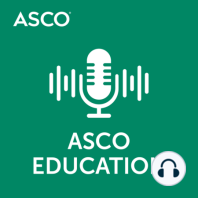6 min listen
Cancer Topics - Can You Hear Me Now? Challenges and Benefits of Telemedicine
FromASCO Education
ratings:
Length:
37 minutes
Released:
May 21, 2021
Format:
Podcast episode
Description
Can you hear me now? In this episode of the ASCO Education Podcast, host Rami Manochakian (Medical Oncologist, Mayo Clinic Florida) discusses Telemedicine with medical oncologists Ana Maria Lopez (Sidney Kimmel Cancer Center), Estelamari Rodriguez (University of Miami) and Douglas Flora (Executive Medical Director or Oncology at Saint Elizabeth Healthcare). Subscribe: Apple Podcasts, Google Podcasts | Additional resources: elearning.asco.org | Contact Us Air Date: 5/20/2021 TRANSCRIPT [MUSIC PLAYING] ANNOUNCER: The purpose of this podcast is to educate and inform. This is not a substitute for medical care and is not intended for use in the diagnosis or treatment of individual conditions. Guests on this podcast express their own opinions, experience, and conclusions. The mention of any product, service, organization, activity, or therapy should not be construed as an ASCO endorsement. [MUSIC PLAYING] RAMI MANOCHAKIAN: Hello, and welcome to the ASCO Education Podcast. Today, we will be discussing the challenges and benefits of telemedicine in oncology, something that has become especially important over the last year in the wake of COVID-19 pandemic. My name is Dr. Rami Manochakian. I'm a thoracic medical oncologist and a vice chair for education at the heme/onc division at the Mayo Clinic, Florida. As the host of today's podcast, I am very excited to be joined by our three distinguished guest speakers. And I'll let them introduce themselves. ANA MARIA LOPEZ: Hi, my name is Dr. Ana Maria Lopez, and I'm a medical oncologist and an integrative oncologist. And I am professor and vice chair of medical oncology and chief of the New Jersey Division of Cancer Services at the Sydney Kimmel Cancer Center in Philadelphia, Pennsylvania. RAMI MANOCHAKIAN: Welcome. ESTELAMARI RODRIGUEZ: Hi, I'm Dr. Estelamari Rodriguez. I am an associate director of community outreach and co-lead of the Thoracic Sciences Group at the Sylvester Comprehensive Cancer Center at the University of Miami. DOUG FLORA: Hi. I'm Doug Flora. I'm a treating medical oncologist. I'm also the executive medical director for oncology here at Saint Elizabeth Health Care just out of Cincinnati, Ohio. RAMI MANOCHAKIAN: Great to have you all here. Without further ado, we'll go ahead and start with our first questions. We all agree, this has been a very, very hot topic lately. And it's probably, for quite some time, it's going to continue to be. When we talk about telemedicine, specifically in oncology, what are some of the main advantages of telemedicine and oncology for patients and for providers, respectively? DOUG FLORA: So obviously, this year, we dealt with a lot being handed at us. And I'm glad that we're coming from three different sections of the country because I think our perspectives will be unique. I'm coming from a community aspect here. We have about four or five hospitals in our system. And I practice in a place that's partially Cincinnati-based, and partially some patients from deep and rural Appalachia. And so obviously, there's some access issues that I think we'll talk about a little bit later. I will say, in our system, it was interesting. We've been trying desperately to get our doctors to embrace telehealth before coronavirus landed on our shores. And it was a struggle as you guys know, and I think we'll talk about. There were some reimbursement issues, and the way that we approached this as a system was not finding traction with the providers. So we went from about 250 patients on virtual visits or telehealth visits the year prior to COVID, to almost 250,000 in our large physician group the year after. And so I wondered if you guys had a similar experience where you were sort of pushed off that burning platform and all of a sudden, had to adapt to technologies that were maybe used in regular world but not yet in medical world yet. So how are things in Miami, Dr. Rodriguez? ESTELAMARI RODRIGUEZ: So at the beginning of the pandemic, as a system, we turned a
Released:
May 21, 2021
Format:
Podcast episode
Titles in the series (100)
Self-Evaluation: NSCLC Treatment Metastatic: Self-Evaluation: NSCLC Treatment Metastatic by ASCO Education
